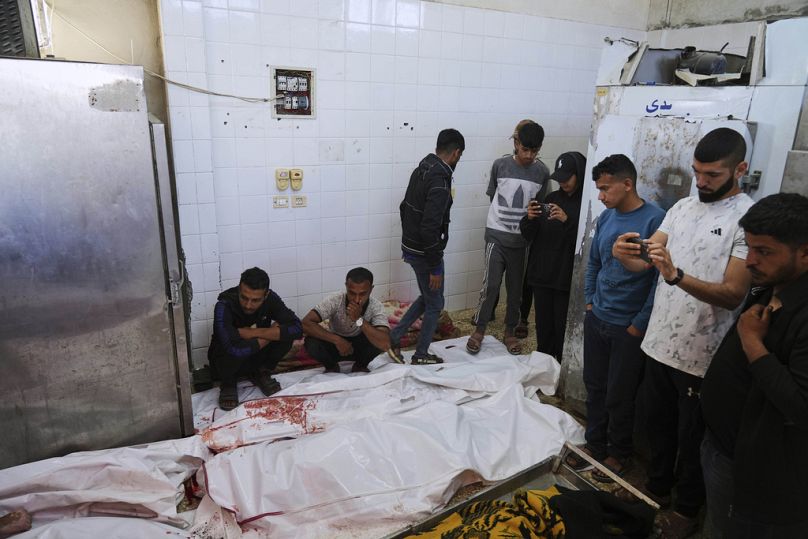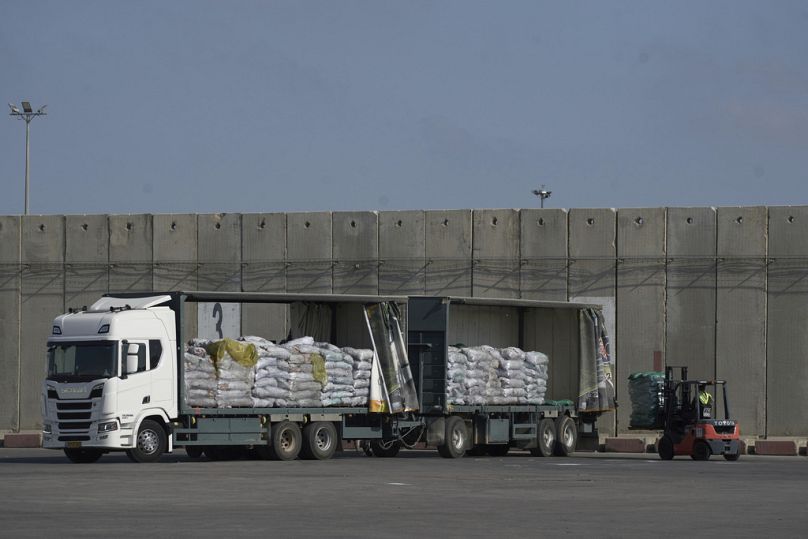Palestinians say one of the two remaining hospitals in northern Gaza was struck on Thursday, causing extensive damage. Meanwhile, the UN says 90 aid trucks have been distributed, but says much more aid is needed to satisfy the needs of Gazans.
Israel went ahead on Thursday with its new military offensive in Gaza despite mounting international criticism. Health officials in Gaza as well as hospital staff say airstrikes were launched across the enclave, killing at least 107 Palestinians and injuring close to 250 more.
 ADVERTISEMENT
ADVERTISEMENT
 ADVERTISEMENT
ADVERTISEMENT
Large plumes of smoke were seen rising in the eastern regions of Gaza City – located in the north of the Strip – as the bombardment continued. A hospital in northern Gaza was also heavily targeted according to hospital officials.
Videos circulating on social media show Israeli tanks and drones reportedly attacking the Al-Awda hospital causing extensive damage and setting portions of the hospital ablaze. Footage released by a staff member at the hospital showed walls blown away and thick black smoke rising above a structure reduced to rubble.
The Israeli military said its forces were operating “adjacent” to Al-Awda Hospital and had allowed emergency workers to come try to put out a fire at the hospital. They denied responsibility for the attack, instead saying “the circumstances of the fire are still under review.”
Israeli forces also targeted the hospital’s water tanks and set fire to outpatient clinics, according to Raafat Ali al-Majdalawi, director of the Al-Awda Health and Community Association.
Al-Awda hospital was one of the only two remaining hospitals in the north of the enclave. It’s not immediately clear how many were injured or killed in those strikes.
Renewed attacks on Lebanon
Israel carried out strikes on multiple areas in southern Lebanon on Thursday, some far from the border, according to Lebanon’s state-run National News Agency.
It described the strikes as “the most violent in some areas” since a ceasefire deal ended the latest Israel-Hezbollah war in November. Residents of northern Israel also reported hearing loud explosions from across the border.
The Israeli army issued warning notices ahead of one strike that destroyed a building in the town of Toul, which it says were facilities belonging to Hezbollah.
Videos of the strike's aftermath showed fire and a massive cloud of smoke rising over an area packed with multi-story apartment buildings. Strikes in other areas were carried out without warning. There were no immediate reports of casualties.
Israel has struck Lebanon almost every day since the ceasefire. Lebanon says those strikes are in violation of the truce agreement, while Israel says it is targeting Hezbollah to prevent it from re-arming.
The wave of airstrikes came two days before local elections are slated to take place in southern Lebanon.
Lebanese Prime Minister Nawaf Salam said the attacks will not “deter the state from its commitment to the electoral process,” and called on the international community to exert more pressure on Israel to stop cross-border attacks and violations of the ceasefire.
Israel denies shortage of food in Gaza
The UN says some 90 trucks carrying aid have arrived in Gaza and their contents distributed to the desperately needing population. It’s around half of the almost 200 trucks that have entered the enclave since Israel ended its nearly three-month blockade of the Strip, which have yet to reach Palestinians.
“The shipments from yesterday is limited in quantity and nowhere near sufficient to meet the scale and scope of Gaza’s 2.1 million people," said U.N. spokesman Stephane Dujarric.
During the latest ceasefire, 600 trucks were crossing into Gaza daily carrying food, fuel, crucial aid and medical supplies.
The Israeli military agency in charge of transferring aid to Gaza, COGAT, said on Thursday however that there are no food shortages in Gaza.
“According to our current assessment, there is no food shortage in Gaza at this time,” COGAT said in a statement on X.
International humanitarian organisations reject this statement, with many calling the aid arriving in Gaza at the moment as a “drop in the ocean” of what’s needed to satisfy the needs of residents.
This week, Israeli Prime Minister Benjamin Netanyahu allowed the flow of aid at “minimal” levels in order to preserve US and allies’ support as international criticism on his government’s conduct of war mounted.
In a televised press conference on Wednesday, the Israeli leader noted that his government’s war on the enclave will not end until Israel achieves all of its military objectives.
The Israeli premier said he was open to another temporary truce to release the remaining hostages, but stressed the ultimately, the war will resume.
Netanyahu emphasised that fighting will only cease after Hamas releases all the remaining hostages, steps down from power, dismantles, disarms and leaves Gaza.
He also announced that long-term plans include the implementation of US President Donald Trump’s controversial post-war plan to relocate the territory's 2.1 million population to neighbouring countries. Trump also said that the US would then “take ownership” of Gaza.
The Palestinians, along with nearly all of the international community, have rejected Trump’s proposal to empty Gaza of its Palestinian population and place the territory under Washington’s control.
The war began when Hamas militants attacked southern Israel on 7 October 2023, killing around 1,200 people, most of them civilians. Hamas took 251 people as hostages, and is currently holding 58, of whom 20 are believed to be alive.
A subsequent Israeli offensive has to date killed more than 53,762 Palestinians, mostly women and children, according to the Hamas-run Gaza Health Ministry whose figure does not distinguish between fighters and civilians.












